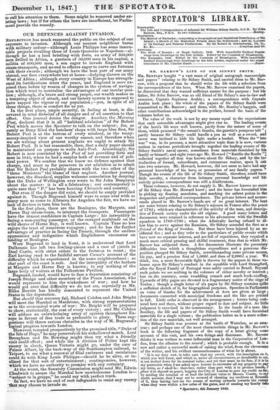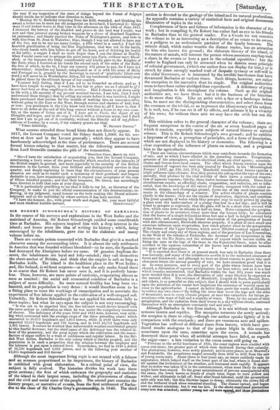SPECTATOR'S LIBRARY.
BIOGRAPHY,
The Life and Correspondence of Admiral Sir William Sidney Smith, G.C.B. By John
Barrow, Esq., F.R.S. In two volumes Bentley.
STATISTICS,
The History of Barbados ; comprising a Geographical and Statistical Description of the Island ; a Sketch of the Historical Events since the Settlement ; and an Account of its Geology and Natural Productions. By Sir Robert H. Schomburgk, Ph. D.,
Re. Re Longman and Glo.
ANNUALS,
The Book of Beauty ; or Regal Gallery, 1898. With beautifully finished Engra-
vings from Drawings by the first Artists. Edited by the Countess of Blessington. The Keepsake, 1848. Edited by the Countess of Blessington. With beautithlty finished Engravings from Drawings by the first Artists, engraved under the super
Intendence of Mr. Charles Heath Bogus • MR. BARROW'S LIFE OF SIR SIDNEY SMITH.
Ma. BENTLEY bought " a vast mass of original autograph manuscripts and papers" relating to Sir Sidney Smith, and carried them to Mr. Bar- row, with a proposal that he should write the life with a selection from the correspondence of the hero. When Mr. Barrow examined the papers, he discovered that they wanted sufficient matter for the purpose : but his father, Sir John Barrow, was an old friend of Sir Sidney's son-in-law and executor, Captain Septimus Arabia ; a correspondence with Captain Arabia took place ; the whole of the papers of Sir Sidney Smith were transmitted to Mr. Barrow; and these, with Mr. Bentley's bargain, and other contributions acknowledged in the preface, formed the basis of the volumes before us.
The value of the work is not by any means equal to the expectations that such ostensible advantages might give rise to. The leading events of the hero's life were well known, partly from the nature of some of them, which procured " the senate's thanks, the gazette's pompous tale"; partly because Sir Sidney could handle a pen as well as a sword, and never was inclined to hide his light under a bushel. When the " late war" was, in its persons, a more attractive topic than it is now, various notices in various periodicals brought together the leading events of Sir Sidney Smith's naval career, sometimes from materials furnished by his family or himself; and eight years ago Mr. Howard [" Rattlin the Reefer "] collected together all that was known about Sir Sidney, and by the in- troduction of formal, subordinate, and extraneous matter, spun it out into two octavoes. Mr. Howard, however, did not seem to have had any personal knowledge of his hero, or possession of any family papers. " Though the events of the life of Sir Sidney Smith, therefore, could have little novelty, a character from intimate personal knowledge and his strictly private correspondence was still a desideratum.
These volumes, however, do not supply it. Mr. Barrow knows no more of Sir Sidney than Mr. Howard knew; and the latter has forestalled him in picking up floating anecdotes, and marking the salient points in the despatches and published correspondence. The private letters and memo- randa placed in Mr. Barrow's hands are of no great interest. The best are some letters relating to Sir Sidney's sojourn in France after the peace of 1782; which are characteristic of the activity of the man, and descrip- tive of French society under the old regime. A good many letters and documents were retained in reference to his adventures with the Swedish squadron in 1789-1790 ; when the Admiralty having refused to al- low him to serve against the Russians, Sir Sidney attended the fleet as a friend of the King of Sweden. But these have been injured by an ac- cidental fire ; and as they refer to the particulars of public events which have now no separate interest, and are full of repetitions, they required a much more critical pruning and skilful treatment, than that to which Mr. Barrow has subjected them. A few documents illustrate the pecuniary difficulties into which a thoughtless expenditure and a generous dis- position plunged Sir Sidney Smith, notwithstanding some private means, his pay, and a pension first of 1,0001. and then of 2,0001. a year. We think, too, a more favourable light is thrown by the papers in these vo- lumes upon Sir Sidney's conduct in the squabble with Lord Strangford, after the Royal Family of Portugal were safely carried to Brazil. Beyond such points we see nothing in the volumes of either novelty or interest ; but on the contrary, some twaddling remark and much book-stuffing. Upwards of fifty pages are devoted to a fragmentary notice of the siege of Toulon ; though a single letter of six pages by Sir Sidney contains quite a sufficient sketch of it, for biographical purposes. Speeches in Parliament on votes of thanks for the achievement at Acre are given at large ; documents connected with municipal freedoms and the like are printed in full. Little order is observed in the arrangement ; letters being scat- tered here and there, without proper regard to date and subject. As little judgment is exercised in the commentary. In the hands of a man like Southey, the life and papers of Sir Sidney Smith would have furnished materials for a single volume ; the publication before us is a mere collec- tion of the raw materials, not well arranged.
Sir Sidney Smith was present at the battle of Waterloo, as an ama- teur; and perhaps one of the most characteristic things in Mr. Barrow's book is the following fragment of the copy of a letter giving some account of this visit, and his own doings and distresses. Mr. Barrow thinks it was written to some influential man in the Corporation of Lon- don, from the allusion to the sword ; which is probable enough. It is a new and rather a sorrowful mode of raising the wind, from the cleverness of the writer, and his evident unconsciousness of what he is about.
" It is my duty now, to take care that my sword, with the inscription on it, which you well know, and which is, under all circumstances, so invaluable to me, is not melted down for its nominal value; and yet that must be its fate, if it is in my possession when I am asked upon honour to surrender all my property to pay m debts, as I shall be: therefore, rather than part with it to profane hands, I e it in deposit in yours, begging the City of London to save my credit so far, by sending the nominal or at least the intrinsic value to Messrs. Contts, to my credit account, that I may not be accused of cheating my creditors at Brussels of it, they having lent me the means of moving onwards towards the enemy when they were within a few miles of the gates, and of sending my family into • ,Spectator, 4th January 1840.
the rear if my inspection of the state of things beyond the Forest of Soignys should decide me to indicate that direction to them.
" Meeting Sir G. Berkeley returning from the field, wounded, and thinking his sword a better one to meet my old antagonist on horseback, I borrowed it: things went ill and looked worse at that time in the afternoon on the 18th of June 1815. I stemmed the torrent of the disabled and givers-in the best way I could; was now and then jammed among broken waggons by a drove of disarmed Napoleon- ist janissaries; and finally reached the Duke of Wellington's person, and rode in with him from St. Jean to Waterloo: thus, though I was not allowed to have any of the fan, not to be one too many (vulgo, a fifth wheel in a coach) I had the heartfelt gratification of being the first Englishman, that was not in the battle, who shook hands with him before he got off his horse, and of drinking his health at his table; a supper I shall no more forget than I can the dinner at Neuilly, when Fouch4 came out to arrange the quiet entry into Paris, without more blood- shed; or the banquet the Duke considerately and kindly gave to the Knights of the Bath, when I received at his hands the second rank of the order of the Bath; the fees of which, by the by, I hope my country will please to pay, for I have not wherewithal: thererore my banner, complicated as it is with the arms of Sicily and Portugal on it, granted by the Sovereign in record of 'gratitude,' (their own word,) will never be in Westminster Abbey, till my hatchment (achievement) may be placed there by the ultimate favour of my country.
"I cannot help feeling, that if I am not to be rewarded as others, and as I have been taught to expect, it would be but fair to place me as I should be if I never had been or done anything in the service. Had I chosen to sit down early in life with a life annuity of my present nominal income, I am told, (but I don t understand these things,) that by selling my estate before it was involved, I might have purchased that income for the trouble of walking into an insurance-office, without going to the East or the West, through storms and showers of hail, lead, or iron: you gentlemen in the City know best how that is; all I know is, that I have to sit down at the end of this long contest without a home in my own coun- try, or the means of living out of it. I have got to Paris, the object of my thoughts and hopes, and in the way I wished, with a victorious army; but I don't see how I am to get out of it creditably, without the friendly aid of my fellow- citizens of London, by a Loan, if my country grants me that.
" Yours faithfully, W. SIDNEY S3IITIL" What success attended these broad hints does not directly appear. In 1817, the Levant Company voted Sir Sidney Smith 1,500/. for his ser- vices at Acre and in the Levant generally ; which they appear to have handsomely acknowledged at the time of performance. There are several formal letters relating to that matter, but the following announcement from Lord Grenville contains the pith of the transaction.
"Hamilton Place, March 14, 1817.
" Sir—I have the satisfaction of acquainting you, that the Levant Company, entertaining a lively sense of the great benefits which resulted to the interests of the British empire in general, and more especially to the security of the British commerce in the Levant, from your brilliant and distinguished services in that quarter, and deeply regretting to learn that the circumstances of your present situation are such as to render such a testimony of their gratitude and respect desirable to you, have unanimously agreed to request your acceptance of the sum of fifteen hundred pounds; and that their treasurer, Mr. Green, has accordingly been directed to hold that sum at your disposal. "It is particularly gratifying to me that it falls to my lot, as Governor of the Company, to make to you the official communication of this determination; re- flecting, in my judgment, equal honour on the body making this liberal acknow- ledgment and on the individual by whose services it has been merited.
"I have the honour, &c., with great truth and regard, Sir, your most faithful and most obedient humble servant, GRENVILLE."



























 Previous page
Previous page